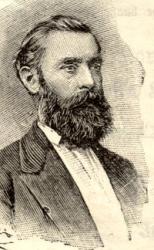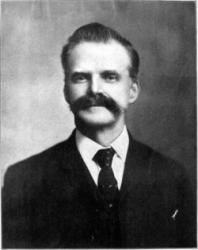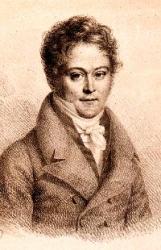Planning worship?
Check out our sister site, ZeteoSearch.org,
for 20+ additional resources related to your search.
- |
User Links
Person Results
Dafydd Jones
1711 - 1777 Person Name: David Jones, Caio (Cyf.) of "Deuwch, bechaduriaid tlodion (Come, ye sinners, poor and wretched)" in Cân a Mawl Also:
Jones, Dafydd, of Caio
Dafydd Jones
E. C. Hoff

1832 - 1894 Person Name: Erik. K. Hoff, b. 1832 Composer of "RESIGNATION" in Christian Hymns Born: January 21, 1832, Bergen, Norway.
Died: December 8, 1894.
A graduate of the Stord seminary, Hoff sang in the Korskirken choir in Bergen, and studied organ and music theory in Vogel. In 1860, he moved to Halmestrand, where he taught two years before taking another teaching post in Oslo. He conducted several choirs in Oslo, and became organist at the Garisonkirke in 1864. King Oscar frequently went to the Garisonkirke to hear Hoff play, and encouraged him to produce a chorale book. Hoff’s works include:
Hoffs Melodibog, 1878 (contained 265 tunes)
--www.hymntime.com/tch
E. C. Hoff
Wilson Marion Cooper

1850 - 1916 Person Name: W. M. Cooper Composer (alto part) of "JESUS IS WILLING (BEACH SPRING)" in The Sacred Harp Produced a major revised edition of the Sacred Harp fasola tunebook, 1902.
Wilson Marion Cooper
Pierre Marie François de Sales Baillot

1771 - 1842 Person Name: Pierre-Marie-Francois de Sales Baillot (1771-1842) Composer of "OLIPHANT" in Many Voices; or, Carmina Sanctorum, Evangelistic Edition with Tunes Pierre Marie François De Sales, born at Passy, France, Oct. 1, 1771, died in Paris, Sept. 15 1842. Instrumental composer, critic, and last great representative of the classical school of violin playing in Paris. Professor of the violin at the Conservatoire. His first master on the violin was an Italian named Polidori, but his real musical education began in 1780 under Sainte-Marie in Paris, and was continued in 1783 under Pollani, in Rome, where he was sent by M. de Boucheport; his playing was influenced also by Viotti, whom he heard in his tenth year. Baillot firs appeared in public in 1791, Viotti procuring him a place in the Théâtre Feydeau, which he soon resigned for an appointment in the Ministère des Finances using his musical talent merely as a recreation, In 1795, after studying compositions of Corelli, Tartini, Geminiani, Locatelli, Bach, and Handel he determined to become a professional musician, and made a successful debut in a concrto by Viotti, which secured his reputation and gained him a professorship of the violin in the newly opened Conservatoire, which he held till his death. He studied also harmony under Catel, and counterpoint with Reicha and Cherubini. Member of Napoleon's private band in 1802. He made a professional tour with the violoncello player Lamare in Russian in 1805-08, but the war brought him home; he gave concerts in the South of France, and started chamber music concerts in Paris in 1815, which gained him great reputation as a quartet player. In 1815-16 he made a second professional tour in Holland, Belgium, and England, becoming a member of the English Philharmonic Society, at one of whose concerts he played on Feb 25, 1816. Director of the band at the Paris Opéra in 1821-31; director of the Concerts spirtuels given at the Opéra, 1822, 1823, 1824; of the Royal Band from 1825; his last tour was made through Switzerland and part of Italy in 1833. Baillot's quartet playing is highly praised by Mednelssohn and Hiller. He had celebrated pupils. He assisted Rode and Kreutzer in compiling a work for the violoncello, and the Méthode de Violon, adopted by the Conservatoire (1803); with the exception of the Art du Violon, which is considered by Fétis the best elementary work of the kind (1834), his works are almost forgotten. His music is difficult. Among his published compositions are: 15 trios for two violins and bass; 6 duets for two violins; 12 études for violins; 9 concertos; Symphonie concertante for two violins, with orchestral accompaniment; 30 airs variés; 3 string quartets; Sonata for pianoforte and violin; 24 préludes in all keys, and several smaller compositions for the violin.
Cyclopedia of Music and Musicians by John Denison Camplin, Jr. and William Foster Apthorp (Charles Scribner’s Sons, 1888)
https://archive.org/details/cyclopediaofmusi01cham/mode/2up
Pierre Marie François de Sales Baillot
Joseph F. Butler
1860 - 1935 Person Name: Jos. F. Butler Arranger of "[Come, ye sinners, poor and needy]" in Sunday School and Revival Joseph Fletcher Butler Joseph Fletcher Butler was born November 10, 1860 in Greenwood, South Carolina. His family eventually moved to Texas, where he married Louisa Lincoln Hubbard in Olden in Eastland County on March 19, 1882. The had 8 children - Alice, Edna, Ida, Olive, Utile, Ella, Alvin (the only son), and Irene.
I believe he was a lifelong Methodist and a farmer. The family lived in Gordon, Texas. The family homestead was inundated amount 1970 or so to form a lake - possibly Lake Palo Pinto, but I'm not sure.
He died October 28, 1935 in Gordon, and is buried in Fox Mountain Cemetery in Palo Pinto County, Texas (near Gordon.)
great grand-daughter
Joseph F. Butler
Charles Dunbar
1858 - 1862 Person Name: C. R. Dunbar Composer of "[Come, ye sinners, poor and needy]" in Glorious Gospel Hymns
Charles Dunbar
S. M. Bixby
1833 - 1912 Composer of "[Come, ye sinners! poor and wretched]" in The Church and Home Hymnal Samuel M. Bixby was born on May 27, 1833 in Haverhill, New Hampshire. His company, S. M. Bixby & Company, manufactured shoe blackings and shoe dressings, but music was his passion. He was also a Sunday school superintendent and choir leader. He died on March 11, 1912 in Fordham, New York. His works include:
Church and Home Hymnal, circa 1893
Evangel Songs, circa 1894
Gloria Deo: A Collection of Hymns and Tunes for Public Worship in All Departments of the Church (New York: Funk & Wagnalls Company, 1901)
NN, Hymnary. Source: http://www.hymntime.com/tch/bio/b/i/x/bixby_sm.htm
S. M. Bixby


 My Starred Hymns
My Starred Hymns

